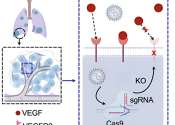Precision pulmonary medicine: Engineers target lung disease with lipid nanoparticles
Penn Engineers have developed a new means of targeting the lungs with lipid nanoparticles (LNPs), the minuscule capsules used by the Moderna and Pfizer-BioNTech COVID-19 vaccines to deliver mRNA, opening the door to novel ...









